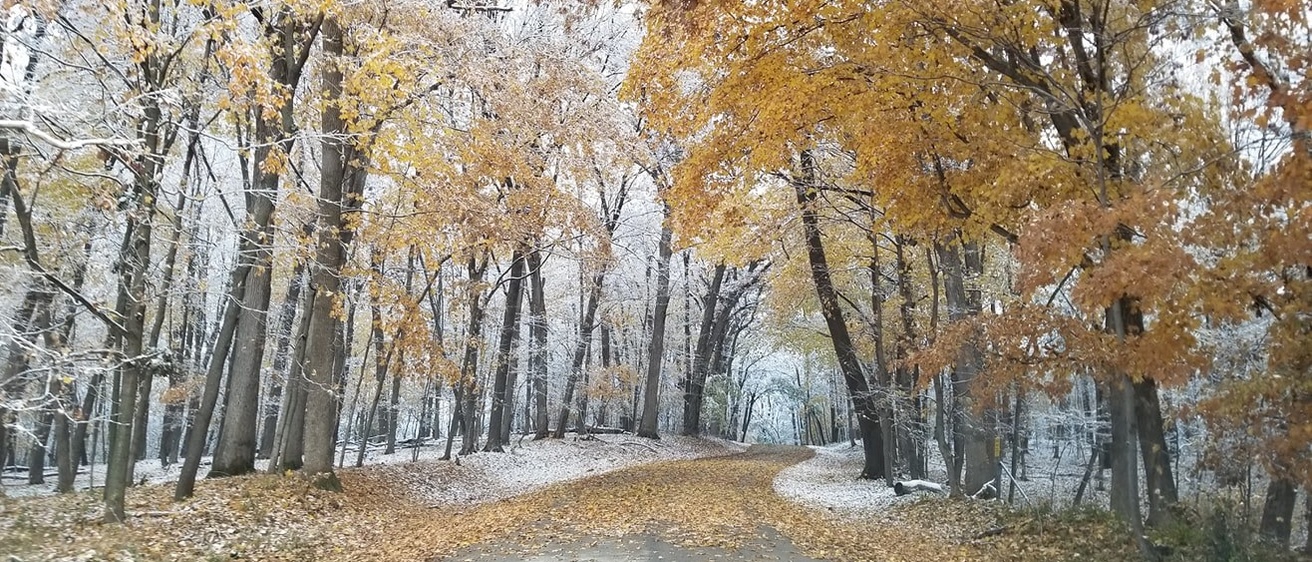I grew up visiting Iowa’s field campus, the Macbride Nature Recreation Area (MNRA), home to my earliest memories of exploring outdoors. It is the place with the “little house” in the forest, in which my sister and I would peer out the window at the bird feeders, counting the songbirds and making up names for each one we saw. This park sits along the shore of Lake Macbride, where I canoed for the first time and contains the prairies where, during every summer of college, I returned as an Iowa Wildlife Camps instructor. It is here that I became an educator. MNRA has been, and continues to be, one of my most prolific teachers.
Through the pandemic and extreme weather events, the park has continued to teach me and others new lessons. The August 2020 derecho transformed many of our outdoor classrooms at MNRA, making places I once knew unrecognizable. An entire pine stand was destroyed, and many trees were toppled.
As time passed, the downed trees began to decay, falling into their component pieces. From the rotting wood, decomposed nutrients enriched the soil and created conditions for new life. In those same places that seemed lost, at least as we once knew them, you may now find a woodland creature that has made a home in a hollow tree trunk or a rare orchid that has found the right soil conditions to thrive. In fact, our land manager taught me that a dead tree creates more life than one that is still alive. The tree embodies two opposite things at once, it is falling apart and providing all the necessary ingredients for life.
Today, my time at MNRA is mainly spent as the Director of Iowa Wildlife Camps and Associate Director of School of the Wild, both in the College of Education’s UI WILD. The park is my office, though I am still at the park outside of “work hours.” I bring campers and students to that “little house,” which I know today as the bird blind at the Iowa Raptor Project . We look out through the blind’s windows observing songbirds, the occasional Cooper’s hawk, and the many squirrels and chipmunks, each bringing so much wonderment to the day’s visitors.
Of the lessons we can take from natural spaces, one that I often return to is like the fallen trees, we can be two opposing things at once.
Here are examples of opposing ideas I am grappling with:
- I love what I do. Working outdoors is my dream job. At the same time, it can be stressful and exhausting.
- I care deeply about conservation. At the same time, I drive to work, I use plastic bags at the grocery store when I forget my reusable bags, and I have yet to plant a pollinator garden full of native plants in my backyard like I said I would.
Sometimes these ideas seem too distant, and I fall into that familiar pattern of all or nothing thinking, such as I’m letting myself and my community down if I take a break from work, or I don’t deserve to be a conservation educator if I am not a perfect conservationist. When this happens, I remember the fallen trees. Here are three of my favorite ways to remember that two opposing ideas and actions are allowed to exist within all of us:
Take work outside. Surrounded by nature, I remember nothing in this world is completely one thing or another. If you have work that requires searching for solutions, or coming up with creative methods, working outside can help. Take a “walking meeting” along the Iowa River. Move that brainstorming session into the shade of our campuses’ historic trees. Studies show that working outside increases creative thinking and helps us feel better at work.
Be still in a local park. I have observed that a group’s attitude can shift significantly when everyone has time to spread out, stand still, and simply sit with the place. It takes a few minutes for everyone to settle in, but once accomplished a switch from excitement to calm occurs. In stillness there is an enormous amount of action that can occur. I am a small piece of this world and hold enormous power to shift attitudes in myself, others, and the world.
Play! Adulthood often excludes many types of play. We may feel as though we have more important things to do or can’t find the time to be playful, but play is an important part of a healthy lifestyle for people of all ages. Exploring local streams and ponds is one way to ensure a very joyful, mud-filled day. Being responsible, productive adults can include play.
If you feel inspired to try these things, I urge you to hold these final opposing ideas. We can allow local outdoor spaces to be a place where we listen to our inner voice to practice caring for ourselves and listen to the voices of those who have and continue to live in and protect these spaces. Look at the university’s Land Acknowledgement before you explore.
Instead of thinking if I can’t do it all, I shouldn’t do it at all, I go outside. I take a break, and I let the natural world remind me, we are works in progress and exactly where we need to be today.
